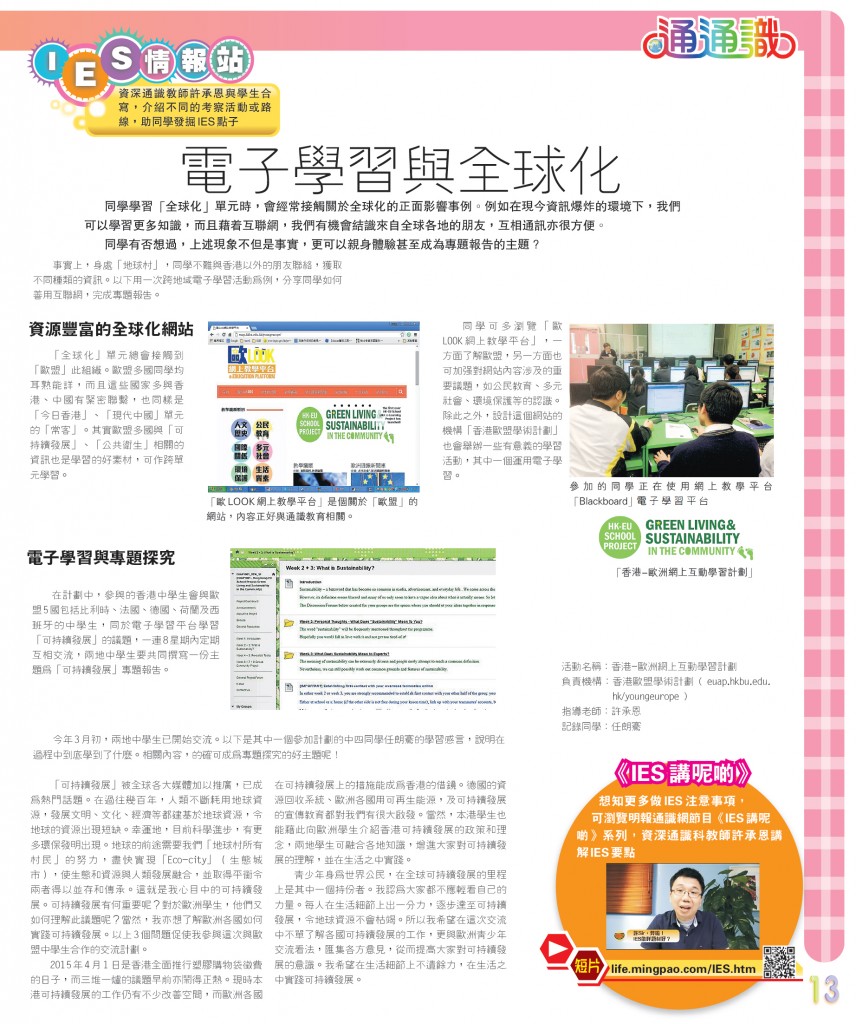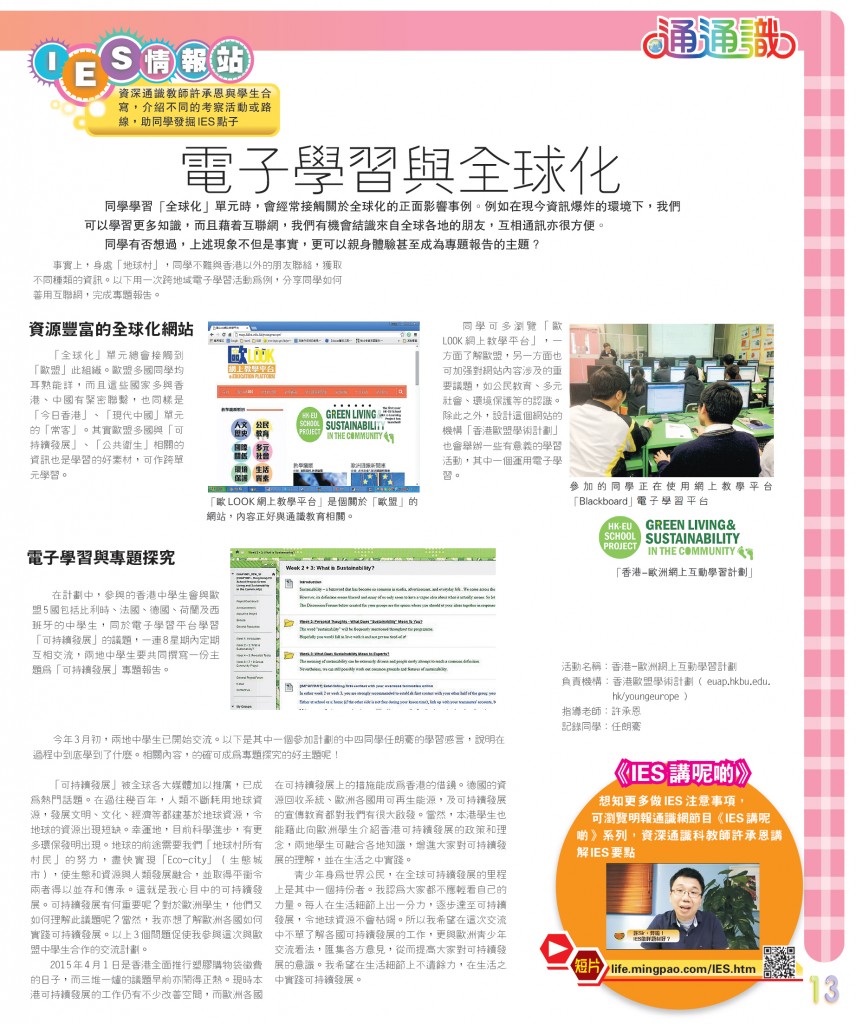 The EUAP HK-EU e-Learning Project is featured in Mingpao’s IES corner “Green living and sustainability in the Community” on 30 March 2015. It is written by Jacob Hui, Chairman of HK Liberal Studies Teachers’ Association. His school, Christian and Missionary Alliance Sun Kei Secondary School, has been participating in the e-Learning project. He has introduced the project as well as the e-Learning Platform “EU LOOK”. A student of Jacob Hui also shared his experience taking part in the project.
The EUAP HK-EU e-Learning Project is featured in Mingpao’s IES corner “Green living and sustainability in the Community” on 30 March 2015. It is written by Jacob Hui, Chairman of HK Liberal Studies Teachers’ Association. His school, Christian and Missionary Alliance Sun Kei Secondary School, has been participating in the e-Learning project. He has introduced the project as well as the e-Learning Platform “EU LOOK”. A student of Jacob Hui also shared his experience taking part in the project.
MINGPAO COLUMN ON LIBERAL STUDIES, MONDAY 30 MARCH 2015
By Jacob Hui, Chairman of HK Liberal Studies Teachers’ Association
Translated by Julian Chan
E-LEARNING AND GLOBALISATION
When students come into contact with the unit of “Globalization” under the Liberal Studies course, they will often come across positive examples and stories of globalization. In today’s environment where explosive amounts of information are fed towards us, we are indeed able to learn much more than ever before, and thanks to the internet, we now have the opportunity to know and meet friends from all over the world, with easy access to communication tools. However, have you students ever imagined that such aspects have not simply become a reality, but that they allow you to gain hands-on experience, and even become the theme of a research project?
In truth, we live in a global village, and it is not difficult for Hong Kong students to be in touch with friends overseas, and gain various perspectives and information. The following activity is an example of a cross-border tele-collaborative learning experience, and we will share how students make full use of the internet, in order to carry out and complete their research projects.
A globalized site with a wealth of resources
The unit of “Globalization” under LS sees students approaching the organization of the “European Union”. The names of the European Union member states will be familiar to the ears of students, and these countries have many close links established with Hong Kong and China. The EU is also a “frequent visitor” in the units of “Hong Kong Today” and “Modern China”. Topics of “sustainable development”, “public health” that are provided here are good learning materials, allowing students to obtain knowledge for cross-units learning.
(Picture 1: “EU Look e-education platform” is a website about the EU, and its contents are especially relevant to Liberal Studies)
Students are encouraged to frequently visit the “EU Look e-education platform”, where they can firstly understand more about the EU, as well as strengthening their own learning across some of the major themes that the platform highlights, including Civic Education, Multicultural Society, Environmental Protection, and so on. In addition to this, the designer of this e-education platform, an organization called the “European Union Academic Programme Hong Kong”, also holds several useful and meaningful learning activities, one of which is the usage of e-learning.
(Picture 2: Participating students using the e-learning platform “Blackboard”)
E-learning and Topical Research
In this project, participating secondary students in Hong Kong will work with students from five EU countries including Belgium, France, Germany, Netherlands and Spain, where they will simultaneously learn about the topic of “Green living and sustainability in the Community” using the e-learning platform. In the 8-week project, they will exchange ideas, and will jointly write a research report on the theme of “Sustainable development”.
In March this year, students from both sides have already begun exchanging and communicating. Below is a participating F.4 student Yam Long Hin’s thoughts and comments, detailing what he has learned so far in this experience. Such content is indeed great ideas for the topics of research!
In recent years, the concept of “Sustainable Development” has been heavily promoted by various forms of media across the world, and has very much become a hot topic. Over the past centuries, humans have incessantly consumed the earth’s resources, in order to develop their civilization, their cultures, their economies, which have increasingly caused depletion and a shortage of such resources. However, fortunately, as technologies mature and modernize, we have seen a multitude of environmentally-friendly inventions. The earth’s future requires us, all the “villagers” in this “global village”, to make an effort, to build “Eco-cities” as soon as possible, and to integrate ecology and resources with human development, in order to draw a balance between the two and allow both to coexist and be continued into the next generations. This, in my mind, is sustainable development. But why is sustainable development so important? To European students, what is their understanding of this topic? Of course, I would like to develop a good understanding of how various European countries practice sustainable development. These three questions I have in mind made me very much wish to participate in this HK-EU School Collaboration and Exchange Project.
1st April 2015 will be the day when Hong Kong introduces a full implementation of the Plastic Shopping Bag Charging scheme, while earlier on, the “Three landfill sites and one incinerator” issue was hotly discussed and debated in the society. Currently, the work in Hong Kong for sustainable development has much room for improvement, and measures that are introduced across various countries in the EU for sustainable development make extremely useful references for Hong Kong. Germany’s recycling & reuse programmes, the use of renewable energies in different EU states, the education + promotion of sustainable living, have all been great inspirations for us. Yet, at the same time, local students here can also take the opportunity of this project to inform and introduce EU students Hong Kong’s sustainable development policies and concepts. This way, both sides can integrate knowledge and experiences that can be shared amongst teach other, and it will also increase everyone’s understanding towards sustainable development, allowing such ideas and concepts to turn into reality in our lives.
The young generation is that of global citizenship, and is also therefore a stakeholder in the global development discourse. I believe that no one should underestimate his/her own ability to bring change. Everyone must make an effort in every detail of his/her life to reach sustainable development stage by stage, so that the earth’s resources will not be exhausted. Hence, in this exchange project, I hope to not only understand more about work that is done in sustainable development across various countries, but to exchange and share views with young people in Europe, to gather different opinions and thoughts, and from this we can hopefully increase knowledge and awareness on sustainable development. I hope to spare no effort in every detail of my everyday life, to genuinely achieve and practice sustainable development.
Name of project: “Hong Kong-EU School Project: Green Living & Sustainability in the Community”
Organisation in charge: The European Union Academic Programme Hong Kong
(euap.hkbu.edu/hk/youngeurope)
Directing Teacher: HUI Shing Yan, Jacob
Recording Student: YAM Long Hin

